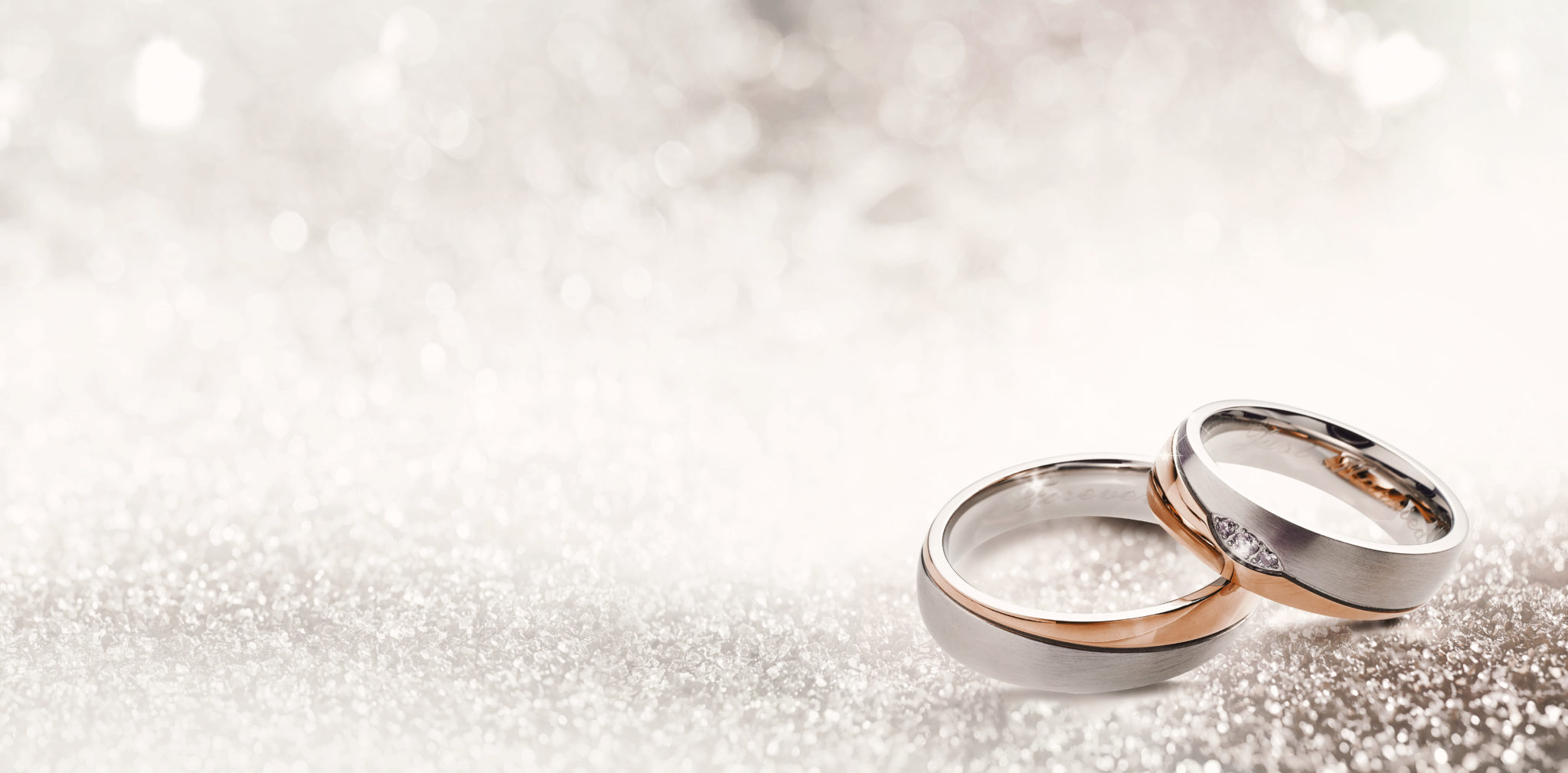Are you trying to decide which metal to use for a wedding or engagement ring? If so, then you have come to the right place!
There are so many metals to choose from that it can be an overwhelming decision.
Many individuals find that it is a daunting task trying to decide which metal to use for their significant other’s ring.
This is because there are many things to take into account. This includes price, durability, etc.
The best metals for wedding and engagement rings are palladium, platinum, tungsten, cobalt, sterling silver, and titanium. These metals are scratch-resistant, strong, durable, and some are even hypoallergenic and lightweight. Titanium is the strongest metal in the world.
If you are trying to decide which is the best metal to use for a wedding or engagement ring, then keep reading below.
We’ve compiled a list of the six best metals and a list of the three worst metals for rings.
With each metal listed, there is a description of why it has been ranked that way.
By reading below, you will discover everything you could ever want to know about the different types of metal used for wedding and engagement rings!
Strongest Metals for Wedding and Engagement Rings
1. Palladium
Palladium is a very common metal for wedding and engagement rings.
They are silvery-white and are perfect if you are looking for a ring of this color.
Palladium rings can be worn daily and you won’t need to worry about causing damage to the ring through everyday use.
Palladium is most commonly used for men’s rings.
Although it can also be used for women, this metal has not yet become as popular for them.
This is because palladium rings are very difficult to shape and work with, therefore there are not many options available.
This is okay for men as they typically use a simple band, but women sometimes want more variety.
Palladium rings are amongst the strongest rings. Their durability is unmatched and they will not easily tarnish.
This is because they are made of 95% pure palladium, which means that they are not made with the metals that make silver tarnish.
They will keep their beautiful silver color forever.
The downside to palladium rings is that they do scratch. However, all rings scratch, and so this is nothing to worry about.
In addition, these rings are not very susceptible to scratches and typically resist most types of surface damage.
Some scratches are unavoidable though. If you wear a ring daily, then there is simply no way to avoid them.
Thankfully, however, the scratches on a palladium ring will most likely be able to be removed.
Professional polishers will know how to remove the scratches with no problem.
Palladium rings do not require much effort to keep them looking nice.
They can be cleaned with polish or other cleaning materials if they need a quick fix-up.
However, they typically remain clean and pristine with little maintenance.
2. Platinum
Many individuals choose platinum to be their wedding or engagement ring metal.
It is a stunning silvery-white metal which is ideal for many couples.
It is expensive but it is worth every penny.
In addition, they do not require a lot of maintenance, which means you will eventually end up saving money.
Because you will not need to pay for regular maintenance, you will discover that the initial price difference isn’t bad at all!
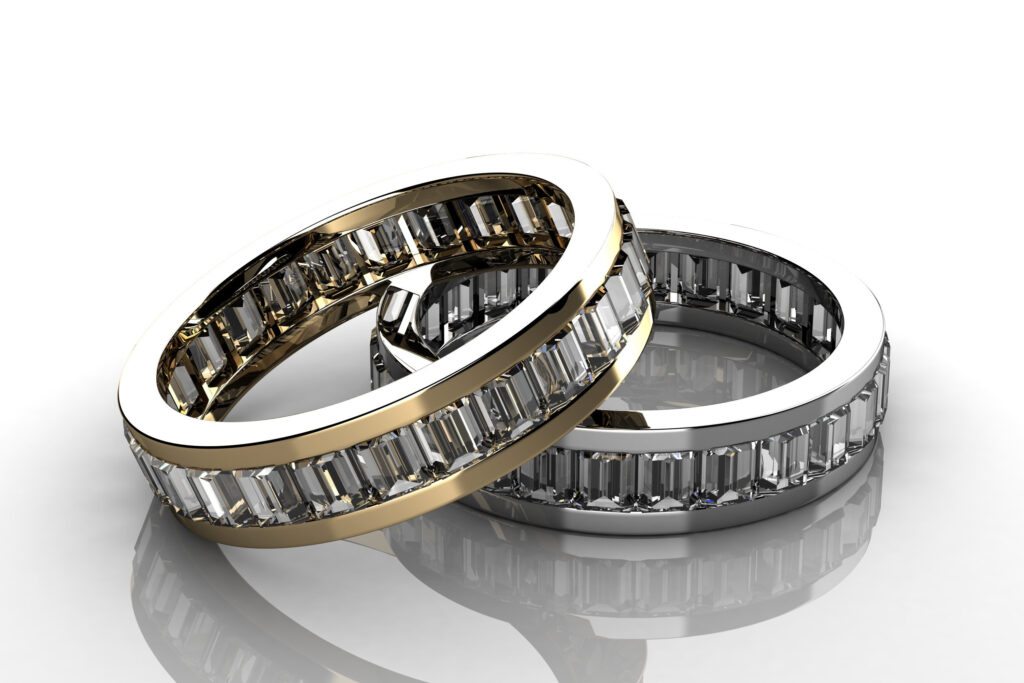
Platinum and palladium rings are very similar. They are both extremely durable, with palladium being slightly stronger.
Platinum rings are very heavy, which some find to be uncomfortable.
They are twice the weight of palladium rings, and they also scratch easily.
If you do not want to take the ring to be polished, you do not have to worry!
Getting scratches increases the durability of the ring, which means you do not have to panic if it gets a scratch.
Rings made of platinum are also hypoallergenic. This is perfect for those who have certain sensitivities to other metals.
Platinum rings truly are one of the best overall metals for wedding and engagement rings.
They will last you a lifetime and you will never need to get a replacement.
3. Tungsten
If you are looking for a strong ring, then tungsten is the way to go.
Your tungsten ring will only be damaged if it’s placed under severe stress. This metal is resistant to both scratching and bending.
Although tungsten is not quite as strong as the previous two metals, it proves time and time again that it is worthy of being regarded as a durable metal.
The scratch-proof surface of this metal is also quite impressive.
You will never find a scratch on your tungsten ring, which is definitely a useful attribute for a wedding ring.
One of the best parts about tungsten rings is that they will always look polished.
No professional help will be needed to keep your ring looking brand new because the ring will do it all on its own!
Although these rings are clearly durable, you will want to be careful when purchasing one.
There are many inexpensive tungsten rings available for purchase, but these are made with cobalt.
This is not what you want as it will corrode with time.
Make sure you do not go for the cheapest option, as you will most likely be disappointed.
Take your time when making your purchase so you can do your research on the ring and you will be sure to make the best choice!
4. Cobalt
Cobalt rings are becoming increasingly popular. They have great durability while still retaining their natural polished look.
Cobalt rings are very affordable. They will not break the bank, and you will be getting a quality ring.
Cobalt rings are comfortable to wear as they are lightweight.
Compared to other durable metals, this one seems to be the most wearable.
You will not have to worry about the ring being too heavy and you will be able to wear it daily without a problem.
Cobalt rings are durable in every sense of the word.
Not only is the metal innately strong, but cobalt rings are also scratch-resistant. They can get scratched, however, it is not common.
One downside to cobalt is that it cannot easily be shaped into different shapes and styles.
Cobalt is not easy to work with and, therefore, is almost impossible to get anything other than a simple band out of this metal.
If your style is simple, then this metal is for you.
However, if you are looking for a more lavish ring, then you may want to consider the other metals before this one.
5. Sterling Silver
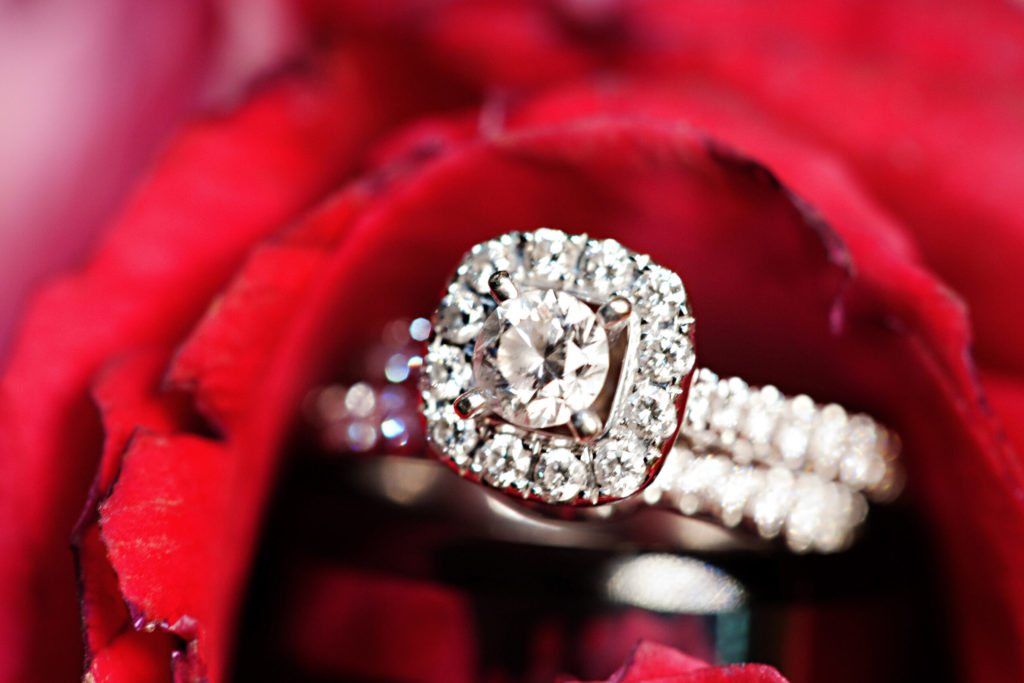
Sterling silver is a classic choice for wedding and engagement rings.
Sterling silver has stood the test of time and proved that it is an excellent choice for all rings.
Unfortunately, sterling silver rings do scratch somewhat easily.
Sterling silver was specifically made to combat this, as pure silver is even softer.
However, sterling silver is still soft compared to some of the other metals discussed.
They easily tarnish and need to receive regular maintenance.
Otherwise, your ring will be bent, scratched, and tarnished, which is never ideal.
If you want to wear your ring regularly, then you will want to know how to care for it properly.
Unlike the previous metal discussed, sterling silver rings are versatile.
These rings can be bent or molded into any shape or style you desire.
There are not many limitations when it comes to sterling silver, and so you will notice that many of the fancier rings are made from this metal.
In addition, they are affordable. Although they appear to be more lavish than some other rings, they are typically less expensive than other metals.
6. Titanium
Titanium rings are known for their strength, as titanium is the strongest metal in the world.
These rings can handle an immense amount of stress and pressure before denting or breaking.
They seem nearly indestructible and they never even scratch. In addition, titanium will not tarnish.
This ring will remain looking as perfect as it did the day you bought it. Nothing can stop the natural shine of titanium, not even the ocean.
Many people who live near beaches purchase titanium rings as the water does not cause corrosion.
Although titanium is so strong, it is still lightweight.
Many assume that because of the strength and hardness of the metal that it will be heavy. However, it is fairly light.
Surprisingly, one of titanium’s weaknesses is its strength.
Because this metal is so strong, it cannot easily be resized.
This can be a problem for many individuals who find that they need to have their ring resized at some point in their lives. However, with titanium, resizing is virtually impossible.
Weakest Metals for Wedding and Engagement Rings
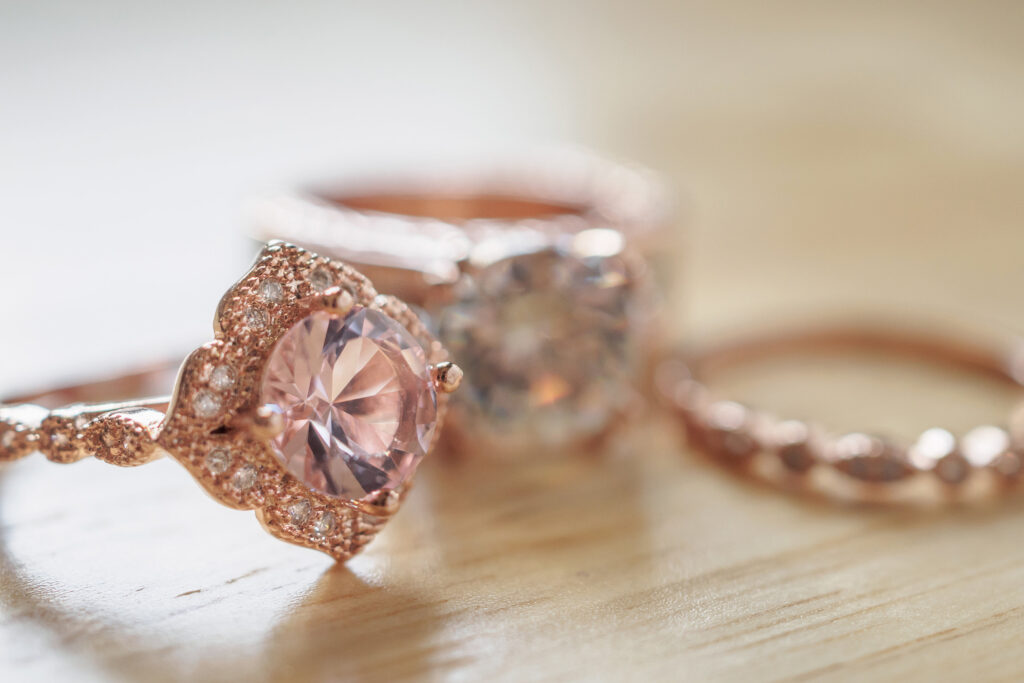
1. Aluminum
Aluminum is regarded as one of the weakest metals for wedding and engagement rings.
Aluminum is really easy to work with, which makes it great to use for different styles of rings.
However, this also will make it dent and deform easily.
In addition, it is very lightweight.
When wearing a wedding or engagement ring made out of aluminum, you will not even notice it is there.
Aluminum rings are easy to care for. They do not require too much maintenance and they will always keep their natural shine.
To clean an aluminum ring, use gentle, unscented dish soap.
You do not have to worry too much about cleaning these rings, as they are clearly very simple to keep looking nice.
Keep in mind that aluminum rings will not rust.
This is great news, as this is a common worry with many other metals. Aluminum, however, is rust-free.
Although you do not have to worry about rust, you do have to worry about the price.
For what you get with an aluminum ring, it is typically overpriced.
While you can find affordable aluminum rings, it may just take a little extra searching.
They are not very strong when they are compared to other metals.
2. Yellow Gold
Yellow gold is arguably the most commonly used metal for wedding and engagement rings.
Yellow gold is a standard choice when ring shopping, and it has been throughout history.
It is easy to care for, especially compared to white gold.
In addition, the elegance of yellow gold is incomparable. It compliments everyone who wears it, no matter what their skin tone is.
One of the greatest parts about yellow gold is that it can be resized.
Because of its malleability, the ring is able to be reshaped to fit your finger at a later time in life.
Many metals cannot do the same because they are nowhere near as flexible.
Unfortunately, one of yellow gold’s strengths is not durability. It easily gets scratches and dents, which makes it one of the weaker metals out there.
The more scratches it gets, the duller it becomes.
To counteract the weakness, you must regularly polish and buffer the ring.
Otherwise, your wedding or engagement ring will have numerous scratches and dents.
When wearing a yellow gold ring, you do not have to worry about the color changing over time.
The yellow will never fade with time. It will maintain its yellow hue no matter how often it is worn.
3. White Gold
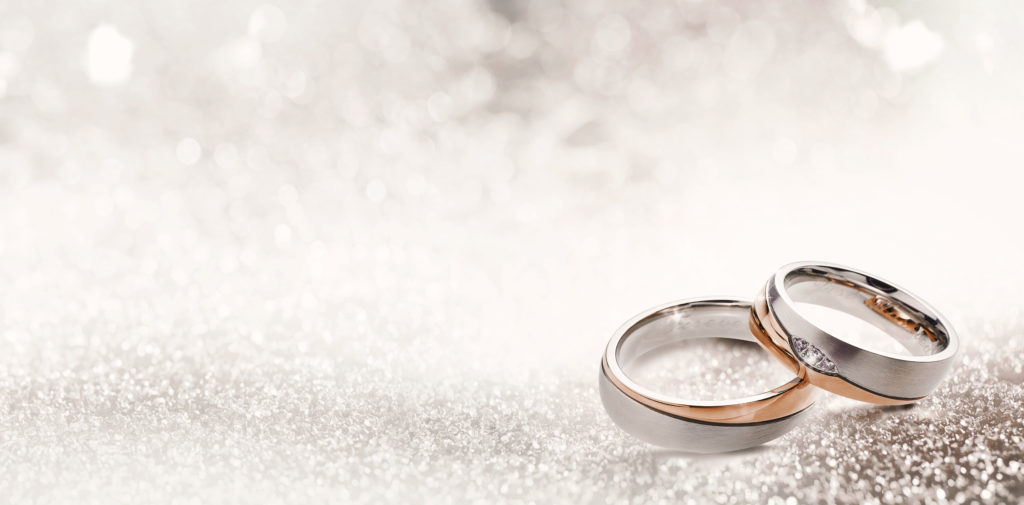
There are many options available for white gold wedding and engagement rings.
White gold is immensely popular in the ring industry, and it is for a reason.
White gold is an exquisite metal, which is why it is so common for wedding and engagement rings.
White gold is initially silver in color. It is not white like many expect. However, the ring will change color the more you wear it.
With an increase in use, the ring will start to turn yellow. The ring will become yellow quicker the more often you wear it.
Although white gold is beautiful, it is not always durable. It can become easily scratched and it is a soft metal.
An upside of white gold is that it is not very expensive.
This is however because white gold does not have the same resistance and durability as many of the other metals have.
Jewelers cannot charge the same price for it as they know it will not last as long as the other types of metals will.
As you can see, although white gold is initially striking, it loses its charm over time.
If you are looking for a ring that you can wear on a daily basis, then this is likely not the metal for you.

